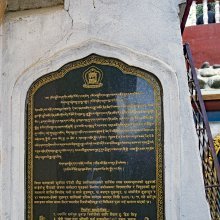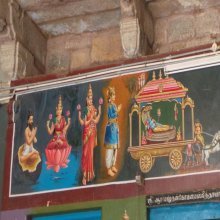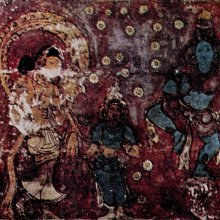Sthala, Sthalā, Sthāla: 22 definitions
Introduction:
Sthala means something in Buddhism, Pali, Hinduism, Sanskrit, the history of ancient India, Marathi, Hindi, biology. If you want to know the exact meaning, history, etymology or English translation of this term then check out the descriptions on this page. Add your comment or reference to a book if you want to contribute to this summary article.
Sthala has 22 English definitions available.
Images (photo gallery)
(+8 more images available)
Languages of India and abroad
Sanskrit dictionary
[Deutsch Wörterbuch]
Source: Cologne Digital Sanskrit Dictionaries: Böhtlingk and Roth Grosses Petersburger WörterbuchSthala (स्थल):—gaṇa jvalādi zu [Pāṇini’s acht Bücher 3, 1, 140] (oxyt.).
1) m. a) Abschnitt, Kapitel [Weber’s Verzeichniss No. 595.] — b) Nomen proprium eines Sohnes des Bala [Bhāgavatapurāṇa 9, 12, 2.] —
2) f. ā Erdaufschüttung [Pāṇini’s acht Bücher 4, 1, 42, Scholiast] sthalayoda.aṃ parigṛhṇāti [Taittirīyasaṃhitā 1, 6, 10, 5.] —
3) f. ī [Pāṇini’s acht Bücher 4, 1, 42.] [Vopadeva’s Grammatik 4, 26.] = sthala n. [Amarakoṣa 2, 1, 5.] [Hemacandra’s Abhidhānacintāmaṇi 940.] [Halāyudha 2, 3.] Accent eines darauf ausgehenden Nomen proprium [Pāṇini’s acht Bücher 6, 2, 129.] a) Anhöhe, hochgelegene Ebene [LĀṬY. 10, 19, 1.] [Mahābhārata 3, 6068.] [Rāmāyaṇa 3, 21, 5.] [Spr. (II) 82.] parvatasya [Rāmāyaṇa 3, 19, 23.] [Kathāsaritsāgara 75, 59.] [Prabodhacandrodaja 101, 9.] malaya [Raghuvaṃśa 6, 64. 12, 24.] [Spr. (II) 1070.] [Kathāsaritsāgara 114, 19.] gaganātso dhastātpravilokayan . sthalīparimitāṃ pṛthvīṃ samudrānparikhālaghūn [52, 7.] uttaṭā iva nadīrayāḥ sthalīm (cikliśuḥ) [Raghuvaṃśa 11, 58.] kanakasikatilasthalīḥ (adj.) sravantīḥ [Prabodhacandrodaja 101, 15.] tīra [Raghuvaṃśa 16, 64.] nabhaḥ [Rājataraṅgiṇī 5, 94.] vihāyaḥ [Oxforder Handschriften 129,a,16.] trailokyamauli [Gītagovinda 5, 20.] von gewölbten Körpertheilen (vgl. taṭa): jaghana [Śiśupālavadha.9,45.] [Spr. (II) 7247.] [morgenländischen Gesellschaft 27,30.] [Oxforder Handschriften 139,a,5. v. u.] nitamba [Spr. (II) 5896.] [Dhūrtasamāgama 80, 15.] upastha [Spr. (II) 6642.] gaṇḍa (s. auch bes.) [PAÑCAR. 3, 5, 9.] [Daśakumāracarita 91, 4.] — b) Erdboden überh.: navāmbhaḥpṛṣatābhivṛṣṭā [Raghuvaṃśa 7, 66. 12, 30.] [Kumārasaṃbhava 4, 4.] śāyin [Spr. (II) 5437.] Fussboden [Bhāgavatapurāṇa 3, 23, 17. 4, 25, 15] (am Ende eines adj. comp.). [7, 4, 11.] [PAÑCAR. 3, 15, 4.] — c) Platz, Ort, Stelle [Raghuvaṃśa 13, 23.] śuṣkavaṃśa [Ṛtusaṃhāra 1, 25.] vanānta [Spr. (II) 5717.] araṇya [Prabodhacandrodaja 85, 10.] trijagatāmutpattināśa [Oxforder Handschriften 108,b, Nalopākhyāna 2.] —
4) n. = sthalī [Amarakoṣa] [Hemacandra’s Abhidhānacintāmaṇi] [Halāyudha] a) Erhebung, Anhöhe, trockenes Land (im Gegensatz zur feuchten Niederung); Land (im Gegensatz zum Wasser), Festland [Hemacandra’s Abhidhānacintāmaṇi 1355.] [Halāyudha 3, 41.] varṣma.sthalam [Taittirīyasaṃhitā 3, 4, 8, 7.] [Kātyāyana’s Śrautasūtrāṇi 24, 6, 34.] [LĀṬY. 1, 1, 19.] same, anūpe, vṛkṣagulmāvṛte, sthale [Manu’s Gesetzbuch 7, 192. 8, 247.] [Yājñavalkya’s Gesetzbuch 2, 151.] samudrormivegena sthale nyastaḥ [Mahābhārata 1, 6744.] nimna, sthala [7, 3389. 12, 4632. 5480. fg.] matsyā babhūvurvyāpannāḥ sthalasaṃsparśanena [13, 2662.] [Rāmāyaṇa 5, 94, 9.] [Suśruta 1, 23, 1. 130, 18.] [KĀM. NĪTIS. 12, 5. 15, 6. 12.] [Spr. (II) 545. 570. 3658. 4392.] gireḥ sthalāni [4963.] na ca naurgacchati sthale [5186.] gāmin [Varāhamihira’s Bṛhajjātaka S. 28, 4.] saṃbhavauṣadhi [41, 2.] uttaraṇaṃ dvipasya toyātsthalam [?91,14. 95,59. Kathāsaritsāgara 29,60. Bhāgavatapurāṇa.2,6,14. 10,40.5,26,28. 10,75,37. PAÑCAR.1,14,8. Hitopadeśa 39,10. 42,13. ed. JOHNS. 2347. 2349. Oxforder Handschriften 23,b, Nalopākhyāna 2. Pāṇini’s acht Bücher.1,3,67, Scholiast] von gewölbten Körpertheilen: uraḥ [Raghuvaṃśa 5, 52. 13, 73.] [Spr. (II) 3142. 7417.] [Varāhamihira’s Bṛhajjātaka S. 44, 21. 53, 52. 58, 32.] [Prabodhacandrodaja 81, 16.] [Bhāgavatapurāṇa 2, 1, 28. 5, 5, 31.] vakṣaḥ [Spr. (II) 6818.] [Kathāsaritsāgara 73, 307.] [Viṣṇupurāṇa 1, 6, 6.] [Bhāgavatapurāṇa 2, 7, 25. 3, 8, 28. 7, 8, 22.] [PAÑCAR. 1, 3, 75. 77. 5, 15. 2, 4, 5.] jaghana [Spr. (II) 7002.] [Kathāsaritsāgara 47, 108.] aṃsa [83, 39.] gaṇḍa (s. auch bes.) [Bhāgavatapurāṇa 5, 25, 4.] [PAÑCAR. 1, 3, 77. 12, 23.] kumbha [Bhāgavatapurāṇa 6, 11, 10.] — b) Erdboden: vidalanti sma kuddālaiḥ sthalāni ca samantataḥ [Rāmāyaṇa Gorresio 2, 87, 10.] sthalārūḍha [Manu’s Gesetzbuch 7, 91.] [Raghuvaṃśa 11, 14.] [Spr. (II) 7219.] komala [PAÑCAR. 1, 10, 50.] [Pañcatantra 246, 6.] nākāśe nāvanisthale [Harivaṃśa 5864.] adya devāḥ saṃprayātāḥ samairvartmabhirasthalaiḥ [Mahābhārata 2, 2517.] Fussboden: harmya so v. a. das flache Dach eines Palastes [Meghadūta 67.] [Mahābhārata 15, 191.] [Bhāgavatapurāṇa 9, 11, 32. 10, 50, 53.] [PAÑCAR. 1, 10, 46.] — c) Platz, Ort, Stelle [Mahābhārata 1, 4996.] [Varāhamihira’s Bṛhajjātaka S. 24, 6.] parasthale [Kathāsaritsāgara 45, 271.] [Pañcatantra 118, 23. 161, 15.] vedi [Rāmāyaṇa 2, 56, 29] (vgl. pratyaksthalī vedī [3, 77, 23]). tapasaḥ Stätte für [PAÑCAR. 1, 2, 51.] tapaḥ [6, 53.] kopāgnīnām [14, 6. 28.] — d) Fall: tathāvidhasthale in einem derartigen Falle [Sāhityadarpana 18, 11. 24, 4. 106, 14.] [SARVADARŚANAS. 7, 14.] svapnasthale [Nīlakaṇṭha 168.] Schol. zu [Kapila 1, 57.] [KUSUM. 34, 15. 36, 7.] Comm. zu [Taittirīyasaṃhitā Prātiśākhya 1, 61. 4, 11. 23. 11, 4. 19, 4. 20, 2.] — e) Nomen proprium (?) einer Oertlichkeit [Oxforder Handschriften 338,b,26.] — Vgl. aṭṭa, adrikṛta, avi, ānaka, ut, ṛtu, kaṇṭaka, kuśa, kuṣṭhala, keli, kratu, gaṇḍa, ghṛta, tapaḥ, tri, dāṇḍāyana (unter dāṇḍāyana), dharma, nabhaḥ, nāga, pariṣṭhala, puñjika, pra, prasava, brahma, mada, madruka, madhya, maru, mahā, māna, māhaka, māhiṣa, muni, mūla, mūṣika, yakṣa, yajña, rāja, loka, vadha, vana, vasu, vāraṇa, viṣṭhala, vṛka, vyāsa, śamiṣṭhala, śubha, śrī, sama, samādhi, samudra, salilasthalacara, siddha, su, sthāla .
--- OR ---
Sthāla (स्थाल):—(nach Andern sthāla) [Uṇādisūtra 1, 115.] = sthala gaṇa jvalādi zu [Pāṇini’s acht Bücher 3, 1, 140.]
1) n. [Amarakoṣa 3, 6, 3, 32.] a) Schale, Gefäss, Topf [Hemacandra’s Abhidhānacintāmaṇi 1026.] [Anekārthasaṃgraha 2, 515.] [Medinīkoṣa l. 55.] [Halāyudha 2, 172.] hiraṇya [LĀṬY. 8, 11, 24.] kaṃsa [25.] [Kauśika’s Sūtra zum Atuarvaveda 53.] rājata [Spr. (II) 7235.] — b) Zahnhöhle [Yājñavalkya’s Gesetzbuch 3,] [?85; vgl. Mitākṣarā III], 30, a, 1 v. u. und sthālaka . —
2) f. ī a) (gewöhnlich irdener) Topf, Kochtopf, Kessel [Amarakoṣa 2, 9, 31.] [Hemacandra’s Abhidhānacintāmaṇi 1019.] [Hemacandra’s Anekārthasaṃgraha] [Medinīkoṣa] [Halāyudha 2, 159.] [Atharvavedasaṃhitā 8, 6, 17.] [Vājasaneyisaṃhitā 19, 27. 86.] [Taittirīyabrāhmaṇa 2, 1, 3, 1.] [Aitareyabrāhmaṇa 1, 11.] parā sthā.īrasyanti [Taittirīyasaṃhitā 6, 5, 10, 3.] [The Śatapathabrāhmaṇa 3, 2, 3, 21. 4, 2, 2, 1.] abhinnā [6, 6, 4, 8. 11, 3, 2, 1.] graha [Kātyāyana’s Śrautasūtrāṇi 9, 6, 25.] sthālyāḥ sruveṇādāya [Aśvalāyana’s Śrautasūtrāni 1, 11, 10.] caru [2, 6, 5. 6.] vā.a.yāḥ, so.agrahaṇīḥ, āditya, ukthya, āgrayaṇa, dhruva [Taittirīyabrāhmaṇa 1, 4, 1, 4. 5.] [The Śatapathabrāhmaṇa 4, 2, 2, 16.] daraṇa [ADBH. BR.] in [Weber’s Indische Studien 1, 39.] [Mahābhārata 3, 10295. 13977. 7, 2159. 2367. 12, 1019. 13, 4422. 15, 727.] [Harivaṃśa 1404.] kṣīraṃ sthālīgatam [Suśruta 1, 149, 11. 164, 9. 2, 74, 18.] vaiḍūryamayī [Spr. (II) 7226.] nahi bhikṣukāḥ santīti sthālyo nādhiśrīyante [SARVADARŚANAS. 2, 20. fg.] [?(= Oxforder Handschriften 216], b, [?18. fg.). Bhāgavatapurāṇa 5, 10, 23. 9, 14, 42. fgg. Pañcatantra 262, 16. Scholiast zu Pāṇini’s acht Bücher 1, 4, 45. 54. Rgva tch’er rol pa ed. Calc. 334, 15.] pidhāna [Mārkāṇḍeyapurāṇa 50, 89.] purīṣa [Bhāgavatapurāṇa 5, 9, 12.] dāna [Oxforder Handschriften 35,a,42.] — b) Bignonia suaveolens (vgl. kāca) [Hemacandra’s Anekārthasaṃgraha] [Medinīkoṣa] — Vgl. kāca, caru, mahā, su .
Sanskrit, also spelled संस्कृतम् (saṃskṛtam), is an ancient language of India commonly seen as the grandmother of the Indo-European language family (even English!). Closely allied with Prakrit and Pali, Sanskrit is more exhaustive in both grammar and terms and has the most extensive collection of literature in the world, greatly surpassing its sister-languages Greek and Latin.
See also (Relevant definitions)
Starts with (+83): Stalakarnam, Stalakkaval, Stalam, Stalamanmiyam, Stalamkaval, Stalankaccelavu, Stalavari, Stalavruksham, Sthala-akramana, Sthala-gauda, Sthala-golardha, Sthala-karana, Sthala-karnam, Sthala-mahatmya, Sthala-patha-karana, Sthala-vritti, Sthala-yatayata, Sthalabhumi, Sthalacara, Sthalacara-prani.
Ends with (+137): Abhedyasthala, Achyutasthala, Acyutasthala, Adhahsthala, Adhassthala, Adhasthala, Adisthala, Adrikritasthala, Agnisthala, Aikyasthala, Akayasthala, Amgalimgasthala, Amgasthala, Ankasthala, Apavadasthala, Arkasthala, Arudhasthala, Arunacalasthala, Asthala, Aupasthala.
Full-text (+323): Sthalacara, Balasthala, Sthalaja, Vakshahsthala, Kushasthala, Mahasthala, Gandasthala, Thala, Sthalata, Madhyasthala, Marusthala, Sthalapadmini, Katasthala, Sthalamanjari, Sthalasiman, Sthalashringata, Acyutasthala, Sthalapatha, Sthalavigraha, Utsthala.
Relevant text
Search found 40 books and stories containing Sthala, Sthalā, Sthāla, Sthaḷa; (plurals include: Sthalas, Sthalās, Sthālas, Sthaḷas). You can also click to the full overview containing English textual excerpts. Below are direct links for the most relevant articles:
A History of Indian Philosophy Volume 5 (by Surendranath Dasgupta)
Part 2 - Anubhava-sūtra of Māyideva < [Chapter XXXV - Vīra-śaivism]
Part 1 - History and Literature of Vīra-śaivism < [Chapter XXXV - Vīra-śaivism]
Part 6 - Vātulāgama < [Chapter XXXIV - Literature of Southern Śaivism]
Kamashastra Discourse (Life in Ancient India) (by Nidheesh Kannan B.)
2. Works on Kāmaśāstra (l): Anaṅgaraṅga < [Chapter 2 - An Appraisal of Kāmaśāstra Works in Sanskrit]
Garga Samhita (English) (by Danavir Goswami)
Verse 3.9.31 < [Chapter 9 - The Birth of Śrī Girirāja]
Verses 2.20.13-16 < [Chapter 20 - The Rāsa-dance Pastime]
Verse 5.6.26 < [Chapter 6 - Seeing Śrī Mathurā]
Trishashti Shalaka Purusha Caritra (by Helen M. Johnson)
Part 22: Description of Meru < [Chapter III - The initiation and omniscience of Ajita]
Bhakti-rasamrta-sindhu (by Śrīla Rūpa Gosvāmī)
Verse 3.3.4 < [Part 3 - Fraternal Devotion (sakhya-rasa)]
Verse 4.1.21 < [Part 1 - Laughing Ecstasy (hāsya-rasa)]
Verse 4.8.76 < [Part 8 - Compatible & Incompatible Mellows (maitrī-vaira-sthiti)]





